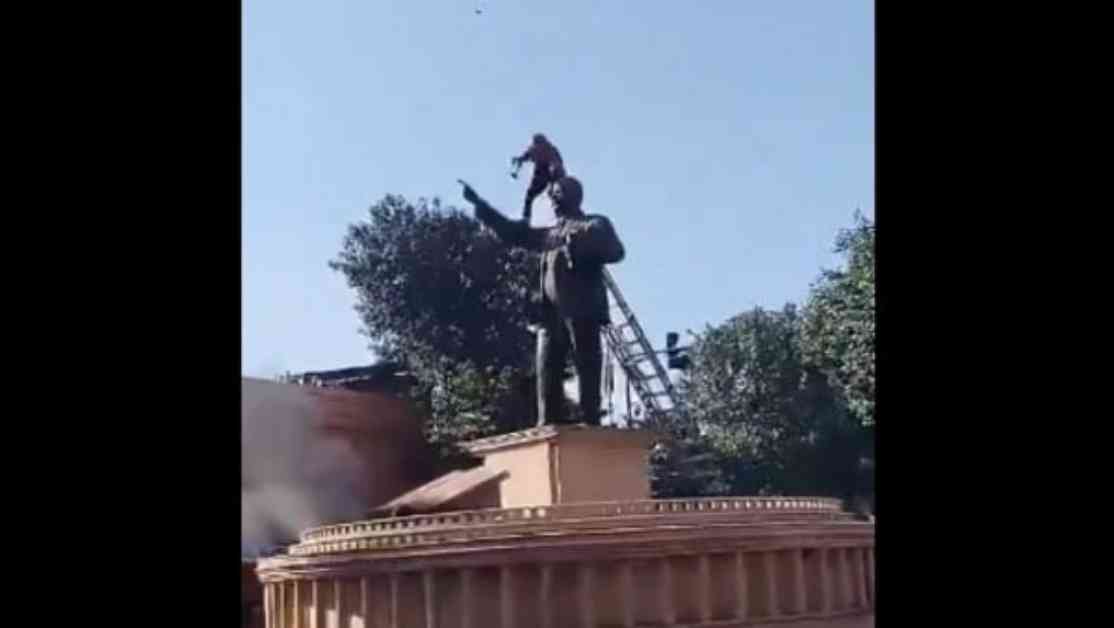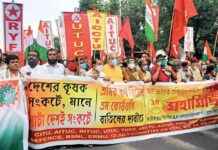A shocking incident unfolded on Republic Day in Amritsar, Punjab, as a man attempted to vandalize the statue of Dr. B.R. Ambedkar, the architect of the Indian Constitution. Akashdeep Singh, hailing from Moga, scaled the statue using a ladder intended for political leaders offering floral tributes. With a hammer in hand, he inflicted significant damage on both the statue of Ambedkar and a sculpture of the Constitution placed nearby. The swift actions of bystanders led to Singh’s apprehension and subsequent handover to the authorities.
The brazen act of vandalism sent shockwaves through the nation, prompting widespread condemnation and calls for accountability. Union Minister Arjun Ram Meghwal wasted no time in demanding an apology from Arvind Kejriwal, the leader of the Aam Aadmi Party (AAP) currently in power in Punjab. Meghwal emphasized the stark contrast between the reverence shown to the Constitution during Republic Day celebrations in Delhi and the desecration witnessed in Amritsar. Speaking to reporters in Rajasthan, Meghwal urged Kejriwal to take responsibility for the incident and issue a public apology.
Meanwhile, Union Minister Ramdas Athawale raised the stakes by calling for the resignation of Punjab Chief Minister Bhagwant Mann, citing what he perceived as a lackadaisical response to the statue vandalism. Athawale, the leader of the Republican Party of India, went a step further by insisting that the perpetrator be punished with the most severe penalty, stating, “The incident in Amritsar is deplorable, but it is being taken lightly by the AAP government. Bhagwant Mann should take moral responsibility and resign as chief minister of Punjab.” The gravity of the situation has not only ignited public outrage but has also triggered demands for a thorough investigation into the circumstances that allowed such an act to occur under the current administration.
Amidst the political turmoil and fervent calls for accountability, it is essential to reflect on the broader implications of this incident. The desecration of a revered figure like Dr. B.R. Ambedkar’s statue strikes at the heart of the nation’s democratic values and social fabric. The symbol of Ambedkar, an icon of social justice and equality, stands as a testament to India’s commitment to inclusivity and progress. Any attempt to tarnish his legacy must be met with swift and decisive action to uphold the principles he tirelessly championed.
As the fallout from the Amritsar vandalism continues to unfold, it serves as a stark reminder of the fragility of our democratic institutions and the responsibility that comes with wielding power. The demands for apologies and resignations underscore the importance of accountability in governance and the need for leaders to uphold the trust placed in them by the people. In times of crisis and controversy, true leadership is defined not by words alone but by actions that demonstrate a commitment to justice, integrity, and the values that bind us as a society.
In conclusion, the vandalism of Dr. B.R. Ambedkar’s statue in Amritsar has reverberated across the nation, sparking a heated debate on accountability and governance. As the political fallout intensifies, it is imperative for leaders to rise to the occasion and address the underlying issues that led to this unfortunate incident. Only through a concerted effort to uphold the ideals of democracy, justice, and unity can we ensure that such acts of desecration are never repeated. The challenge now lies in turning this moment of crisis into an opportunity for reflection, growth, and meaningful change.


























